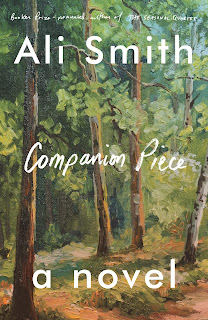Companion Piece by Ali Smith: A review
This book follows Ali Smith's Quartet series (Autumn, Winter, Spring, Summer) all of which I read, enjoyed, and reviewed here. I enjoyed this one, too, although I find it hard to summarize it or really to explain my enjoyment of it.
“You were really good at sounding like you knew what a line of poetry meant,” Martina says. “You just knew what things meant.” And Sandy, surprised, and a bit suspicious, does not disappoint. “There’s a choice,” she tells Martina, puzzling it over, immersing herself. “A curlew is a bird, and a curfew is a time of day after which people officially aren’t, by authority, permitted to be out and about.” She goes on, feeling her way in. “And if we think about the proffered choice, curlew or curfew, between nature and an authoritarian shaping of time, which is a human invention. …” Martina stops her, pleased. “You haven’t changed a bit,” she says to Sandy. And Sandy blushes without, she tells us, knowing why.
The book is divided into three parts. The first part is called "You Choose." In it, Sandy confronts a world that is sick not only with Covid but with spreading oppression and injustice. She is an artist but in the malaise of the moment, she begins to question the power of art.
The second part is called "Curlew" and its theme is freedom. It turns out that Martina had disappeared after talking with Sandy, and her children believe the two events are somehow related. They turn up at Sandy's house, a bit like refugees, and although Sandy wants them gone, she can't bear to force them to leave. Her freedom to act has been infringed.
Sandy's father had become ill, apparently with Covid, and had had to be hospitalized. He begins to recover but is still hospitalized and Sandy has taken on the care of his dog, including daily walks. On one of her walks, she meets a girl on a bicycle who recognizes the dog and asks about its owner. This incident is how the book ends.
I admire Ali Smith's command of language and her use of words. It makes reading one of her novels an especially pleasurable experience. And yet, in this instance, I felt that I somehow did not quite "get" the message that the author wanted to deliver. Perhaps if I took the time to read it a second time, it might become clearer. But I have promises to keep and books to read before I sleep. So many books to read before I sleep.


Sometimes that's all I feel like doing with a book. If I don't really get everything the author was trying to share in her book...well, the author should have worked a little harder, I think.
ReplyDeleteBecause you are right---and the author should know this---so many books...
Exactly. When I first learned to love reading books, there were a few books that I fell in love with and read over and over again. I remember one was called "The Light of Western Stars" by Zane Grey. My friend Shirley loaned it to me and I kept it so long she finally had to strongly insist that I return it! But, no more. The world and I had more time back then. Now time is flying and so must my reading.
DeleteI'd like to try this author, but I think I might start with one of her other books first.
ReplyDeleteI would recommend starting with her Seasons Quartet, the first one being "Autumn."
DeleteSounds like a really good book! I have not read anything by Ali Smith before, so will check the out out. As a side note,I also find myself not always "getting" an author's message either... I want to reread their book as well, but find myself wanting other books waiting to be read!! Bookish problem!!
ReplyDeleteShe is a very good writer, author of many interesting books, including this one.
Delete